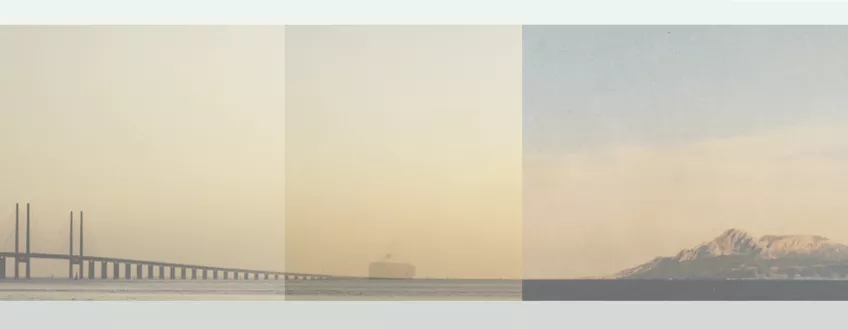Program
Mobile bodies, travelling theories - Öresund / Gibraltar
A webinar series on borderland formation at Europe’s antipodes
14 September, at 14.30 to 16.00
Territories beyond compare?
An exploratory roundtable on the Öresund and Gibraltar borderlands
Geovisualisations of borderland formation are hard to come by in both the Öresund and Gibraltar contexts. In this introductory roundtable, we ask: What exists, and what is missing from existing scholarship? What methods and techniques might we draw upon to better represent the territorial extent of the respective sea regions? How might these characteristics reflect other long-standing forms of socio-spatial cohesion and fragmentation in the area? What opportunities can visualisation and other forms of representation and story-telling offer residents to new ways to see, understand and engage with borderland formation in the Öresund-Gibraltar regions?
Participants:
Eugénie Denarnaud, École Nationale Supérieure du Paysage de Versailles
Burcu Yigit Turan, Swedish University of Agricultural Sciences
Medine Altiok, AA School of Architecture
Marie Northrup Christensen, Almen modstand
This seminar was recorded. To get access to the video on YouTube, send an email to mia [dot] krokstade [at] cors [dot] lu [dot] se (mia[dot]krokstade[at]cors[dot]lu[dot]se) with the subject “Territories beyond compare”.
28 September, at 14.30 to 16.00
(Im)mobile bodies, travelling stories:
Traversing cinematic representations of borderland identity and belonging
How do artistic and cultural practices shape the construction of collective memory and identity in borderland formation? How do these territorial markers, stories and discourses tell us something about “regional ways of doing things” and the “mental boundaries” that render these places as recognisable from other areas? How might the circulation of bodies and narratives also help us to re-connect the region to other “imagined communities”, and why?
Pei-Sze Chow, University of Amsterdam: "Mediating regional space and identity in the Øresund region"
Randa Maroufi, visual artist: "Bab Sebta" (Ceuta Gate)
Respondents:
Annette Hill, Lund University
Kristine Samson, Roskilde University
This seminar was recorded. To get access to the video on YouTube, send an email to mia [dot] krokstade [at] cors [dot] lu [dot] se (mia[dot]krokstade[at]cors[dot]lu[dot]se) with the subject “(Im)mobile bodies, travelling stories".
12 October, at 14.30 to 16.00
Bordering money:
Crisis and change at the geoeconomic frontier
What economic strategies and techniques do public authorities employ to enhance the circulation of people and capital throughout borderzones? How are these activities materially and symbolically legitimated in the territory? How does cross-border cooperation seek to mitigate against geo-economic different forms of regional instability and vulnerability? What effects do such strategies have on region-building efforts and residents themselves?
Christer Persson, Malmö University: "A region in trouble? Öresund 20 years after the bridge"
William Kutz, Université de Paris-Cité: "Local geoeconomics: efforts to re-border Spanish market power in North Africa"
Respondents:
Kristian Olesen, Aalborg University
James W. Scott, University of Eastern Finland
This seminar was recorded. To get access to the video on YouTube, send an email to mia [dot] krokstade [at] cors [dot] lu [dot] se (mia[dot]krokstade[at]cors[dot]lu[dot]se) with the subject “Bordering money”.
26 October, at 14.30 to 16.00
Appropriation tactics:
Counter-cartographies of borderland infrastructure
In what ways has fixity and mobility structured borderland formation in the Öresund-Gibraltar regions? How are different social, material, technological ''infrastructures” appropriated to negotiate or contest the dominant modes of bordering practices? How might these efforts influence the formation of distinctly regional landscapes and ways of life?
Cecilia Fredriksson, Lund University: "Seaweed Stories. Exploring the blue fields of Öresund."
Mouna Deghali, ENSA de Paris-La-Villette: "Micro-infrastructures of Gibraltar/Bir-Chifa"
Respondents:
Lina Olsson, Malmö University
Marco Mogiani, University of Vienna
This seminar was recorded. To get access to the video on YouTube, send an email to mia [dot] krokstade [at] cors [dot] lu [dot] se (mia[dot]krokstade[at]cors[dot]lu[dot]se) with the subject “Appropriation tactics”.
9 November, at 14.30 to 16.00
Invisible borderscapes:
Tracing the overlooked, forgotten and taken-for-granted
What are some of the unintended or unexpected consequences of borderland formation otherwise overshadowed by more established representations of each region? What impacts might these the overlooked, forgotten or taken-for-granted phenomena have on residents’ mental maps of the borderzone, their sense of socio-territorial cohesion and place-making? What realities do these invisible borderlands produce as a result?
Nina Grønlykke Mollerup, University of Copenhagen
Hicham Gardaf, visual artist: "Interrogating the cultural landscape of Georges Perec’s ‘species spaces’ in Greater Tangier"
Respondents:
Christophe Sohn, Luxembourg Institute of Socio-Economic Research
23 November, at 14.30 to 16.00
More-than-human borderlands:
Cross-border entanglements of land and sea
How does borderland formation shape, and is shaped by, the encounter between human- and other-than-human beings? What socio-spatial relations do they constitute? Through what cultural artefacts and social practices are they inscribed in the landscape? How do these more- and other-than-human relations help us to reconsider existing depictions of a regional identity and boundary-making?
Lisa Babette Diedrich, Swedish University of Agricultural Sciences
Gini Lee, Melbourne University: "Öresund as a water-city landscape"
Eugénie Denarnaud, École Nationale Supérieure du Paysage de Versailles: "Pirate gardens and the rural transformations of the Gibraltar Strait"
Respondents:
Mathilda Rosengren, Malmö University
Sarah Green, University of Helsinki
This discussion was recorded. To get access to the video on YouTube, send an email to mia [dot] krokstade [at] cors [dot] lu [dot] se (mia[dot]krokstade[at]cors[dot]lu[dot]se) with the subject “More-than-human borderlands”.
7 December, at 14.30 to 16.00
Towards borderland futures?
Closing discussion
Following a short wrap-up of the key takeaways from the previous sessions by William Kutz, the final meeting will be held to discuss ways of moving forward to the next stages of the seminar series. For example, how might we want to bring together the ideas and materials we discussed to connect with wider audiences in the Gibraltar and Öresund regions? What mapping projects, events or publications might we organise for the future? How might these activities connect with other groups doing work on other water-based border zones elsewhere in the world?
A public discussion moderated by William Kutz, Université de Paris-Cité
Contact
Johanna Rivano Eckerdal
Head of Centre for Oresund Region Studies
johanna [dot] rivano_eckerdal [at] kultur [dot] lu [dot] se (johanna[dot]rivano_eckerdal[at]kultur[dot]lu[dot]se)
+46 46 222 30 35


